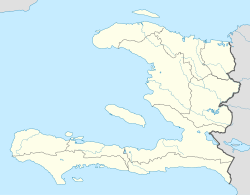Lascahobas
Lascahobas
Laskawobas | |
|---|---|
| Coordinates: 18°49′46″N 71°56′11″W / 18.82944°N 71.93639°W | |
| Country | |
| Department | Centre |
| Arrondissement | Lascahobas |
| Settled | 1763[1] |
Lascahobas (Haitian Creole: Laskawobas; Spanish: Las Caobas) is a commune located in the Centre department of Haiti, roughly one hour east of Mirebalais, 10 minutes south of Lac de Peligre, and one hour west of the border with the Dominican Republic.[citation needed]
The population is about 7,574 people, as of 2012.[2]
History and character
[edit]Lascahobas is the market town of a rural, agricultural area. Outlying villages in the area include Cohoroes, Rantamoulie, LaHoye, and Pouly (also spelled Poulie or Poule), Flande, and Pareidon. The city and villages surrounding it have been the focus of missionary work by the Episcopal Church in the early 21st Century.[3][4][5]
It was founded as Las Caobas by Spanish colonists in 1763.[1]
Economy
[edit]Primarily agricultural, with a bustling local market and a large Roman Catholic church, the city sits on the significant Lascahobas River.
The wealthiest business in town are agriculture development and farming.[6]
Lascahobas has an Episcopal church, St. Esprit (Holy Spirit), which also has a school.[3][7][8] As of early 2013, the Rector of the Church of the Holy Spirit was The Rev. Jean Milor Medela; Fr. Medela also serves as priest at the Church of the Ascension in Poulie.[4] As of October 2016[update] they were replaced by Fr. Jean Jacques Deravil.[5]
The 2010 Haiti earthquake damaged some parts of Lascahobas, but didn't affect the ongoing installment of solar panels for electricity. In 2011, volunteers from the United States installed solar panels to allow for Internet connections.[9][10] Installation was completed in early 2013.[3][4]
Tourism
[edit]Vodou festivals occur regularly throughout much of the year in the surrounding hills.
Mon Fo, located on the west edge of town is the highest elevation in the area, that at some point was used as a military fort. All that remains of the fort are crumbling ruins of walls and a large cannon with a Fleur de Lis.
Carnevale is celebrated annually in the whole town.
Transportation
[edit]Lascahobas is bisected by Route 305.[11]
Education
[edit]There are two primary schools, one Roman Catholic and one Episcopal, in Lascahobas. Each of the four outlying villages also has a primary school operated by the Episcopal church.[3] The newest schools are in Poulie and Flande.[5] There are no secondary schools nor public schools in the area.
References
[edit]- ^ a b Emilio Cordero Michel; Roberto Cassá. "La Huella Hispánica en la Sociedad Dominicana" [The Spanish trace in the Dominican Society] (PDF). 2013 (in Spanish). Historia Dominicana (The authors belong to the Dominican Academy of History). Archived from the original on 22 June 2013. Retrieved 2 December 2016.
- ^ "Population of Lascahobas, Haiti". Mongabay.com. January 19, 2012. Archived from the original on June 29, 2013. Retrieved December 2, 2016.
- ^ a b c d "Mission from the Cathedral: Mission Trip to Haiti: Two teams over Two Weeks: School Support: medical team," Swan & Elk (newsletter of the Cathedral of All Saints, Albany, New York), Eastertide 2013, pp. 6-7.
- ^ a b c David J. Collum, "The Albany Mission Trip to Haiti", Newsletter, Episcopal Diocese of Albany, May 2013, p. 18.
- ^ a b c "A Mission Team returns to Haiti", Albany Episcopalian, Vol. 14, No. 1, Lent 2017, p. 11.
- ^ Lyon, Evan (Fall 2005). "The Only Fat Man in Lascahobas". Bellevue Literary Review. Retrieved December 2, 2016.
- ^ "St. Esprit, Lascahobas, Haiti". Episcopal Church. 2013. Retrieved April 15, 2013.
- ^ "Solar Classroom in Lascahobas, Haiti". Engineers for a Sustainable World. January 2010. Retrieved April 15, 2013.
- ^ Horsman, Laura (January 10, 2012). "Solar-powered Internet Connectivity in Lascahobas, Haiti". Renewable Energy World. Archived from the original on February 14, 2015. Retrieved April 15, 2013.
- ^ "Final Report: Connecting the Community of Lascahobas, Haiti to the Internet (abstract)". Internet Society. January 2, 2012. Retrieved April 15, 2013.
- ^ "Lascahobas: Haiti". Google Maps. Retrieved April 16, 2013.
External links
[edit]- Lascahobas information (in French Creole)
- Facebook page of Ville de Lascahobas
- Solar installation in Lascahobas, Haiti
- Friends of the Children of Lascahobas, Haiti website


